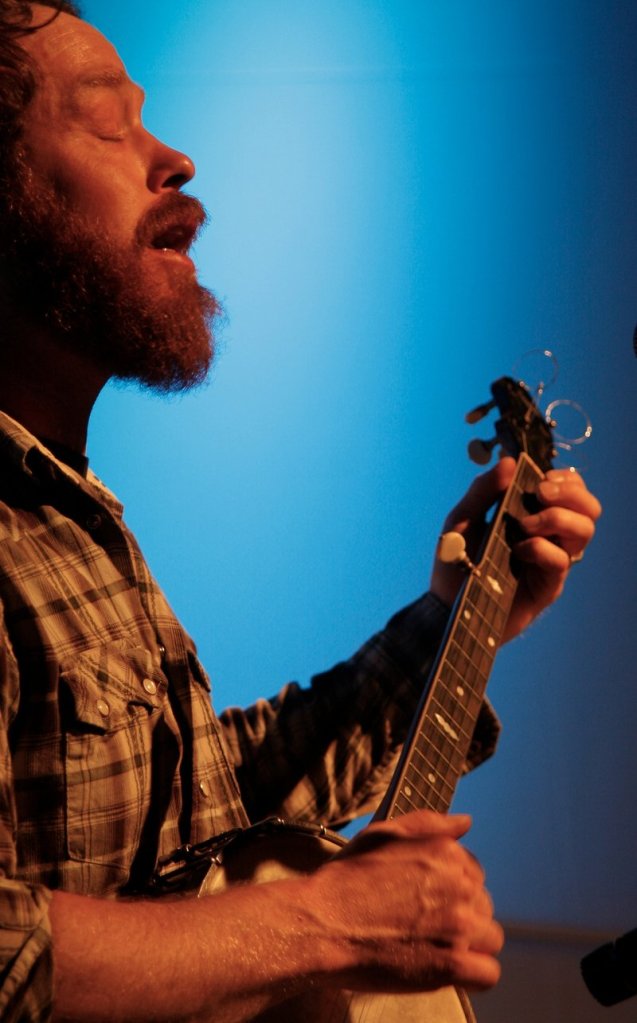There are two types of performers out there.
There are the manufacturers, who calculate, create and present something that, according to their specifications, should work as an interesting piece of music. And while we’ve all fallen prey to this artifice at one point or another, the persona of one of these conjurers crumbles like an old cookie upon closer scrutiny.
Not so with the other kind of performer who might be called a vessel, where raw emotion and creation spill out of some wellspring inside. These types can’t help themselves.
Many Maine ears can tell just by feel that roots alt-country artist D. Gross lands squarely in the latter camp. Gross treasures his grandmother’s banjo, which he toted around the Carolina hills because he figured he might learn something there. He’s found a kindred spirit in another vessel-type, Samuel James, and his writing is drawn from provocation, not what he thinks might sound good.
GO caught up with Gross before his performance at She Doesn’t Like Guthrie’s in Lewiston at 9 p.m. Friday.
“We Left The Roadside” came out in September. Does it sound different to you now as compared to when you made it? Has it taken on a life of its own?
I actually haven’t listened to the record since I finished mastering it. After writing, rehearsing, recording, mixing and mastering the tunes, I was pretty tired of hearing them. I have, however, received great feedback from listeners, reviewers and radio folks, and every now and then someone will offer a critique that makes me feel like I was successful in getting across what I set out to. I suppose it has taken on a life of its own, and I wish it many happy years.
You’ve enjoyed a connection to Portland staple Samuel James. How did that relationship come about? Are you two cut from the same cloth?
Samuel and I met on a public access television show. From there, we would get together frequently to play, to bounce ideas off of each other, and most importantly, to steal from each other. I suppose we’re similar in the sense that we share a deep appreciation for the music we play, and we share a deep-seated drive to propel the genre into the 21st century. And, apart from sharing musical interests, we share the love of pontification on a host of topics, reverent and not.
How does your seven-year run in Los Federales compare to the solo gig? Which do you prefer? Have you played with those guys since?
The solo gig is a much easier thing to manage. It is also a more personal pursuit, which has benefits and drawbacks. There’s not much greater than making music with other people, and I do miss that. Ideally, I’ll be doing both solo and group performances in the near future. And Los Feds got together about six weeks ago for a show at Space Gallery and made some great music. We all share so much history that it’s very easy to fall back into a musical conversation.
You spent some time in the North Carolina hills. What did you learn there?
North Carolina taught me that spring actually exists. And beyond that, I was exposed to some of the finest bluegrass music in the country. Also, as someone who grew up in Maine, it was enlightening to learn a musical style and to live in the culture it grew up in all at the same time. There is something resonant about the hills of western North Carolina, and I think many a music maker has been drawn there for that reason.
If writing comes in “fits and starts,” as you’ve mentioned, what turns a fit into a start? What triggers the need to put down a tune or a story?
Writing, for me, is a slippery guest. I suppose a fit becomes a start when I feel like I’ve tapped into a vein of thought at the proper depth. Like the glass onion, there are many levels from which one can consider the same thing. When I feel I’ve found the proper vantage point, the songs come very naturally. And as for what triggers a song, I usually get caught up on a phrase, event, sentiment or colorscape that I turn over in my mind until it takes expressible shape or just moves on.
What are you most excited for in 2011?
I’m looking forward to taking my show on the road and starting another band. I’m real pleased with the way my album turned out, and I’d like to bring that music to as many sets of ears as possible.
Which are the best-sounding songs on your grandmother’s banjo?
Since the banjo was built in 1923, I like to play some old numbers on it. Currently, I’ve worked up a rendition of “Shady Grove” that I think the banjo enjoys, as well as a version of “Sweet Sunny South.” I do play some of my own songs on it as well, but I think it likes the older ones a little better.
Mike Olcott is a freelance writer who lives in Portland and Boston.
Copy the Story Link
Send questions/comments to the editors.



Success. Please wait for the page to reload. If the page does not reload within 5 seconds, please refresh the page.
Enter your email and password to access comments.
Hi, to comment on stories you must . This profile is in addition to your subscription and website login.
Already have a commenting profile? .
Invalid username/password.
Please check your email to confirm and complete your registration.
Only subscribers are eligible to post comments. Please subscribe or login first for digital access. Here’s why.
Use the form below to reset your password. When you've submitted your account email, we will send an email with a reset code.